Vodafone HRM Report: Employee Relations, Legislation, and Practices
VerifiedAdded on 2023/01/03
|11
|4131
|26
Report
AI Summary
This report provides a comprehensive analysis of Human Resource Management (HRM) practices within Vodafone. It begins with an introduction to HRM and its strategic importance, followed by an examination of workforce planning and resourcing, including the purpose and functions of HRM in this context. The report then delves into Vodafone's recruitment and selection approaches, comparing their strengths and weaknesses. It further explores the benefits of various HRM practices for both employers and employees, and their effectiveness in raising organizational profit and productivity. The importance of employee relations and the application of employment legislation in HRM decision-making are also discussed. Finally, the report illustrates the application of HRM practices in a work-related context. The report provides a detailed overview of HRM strategies, practices, and their impact within a multinational telecommunications company, Vodafone.
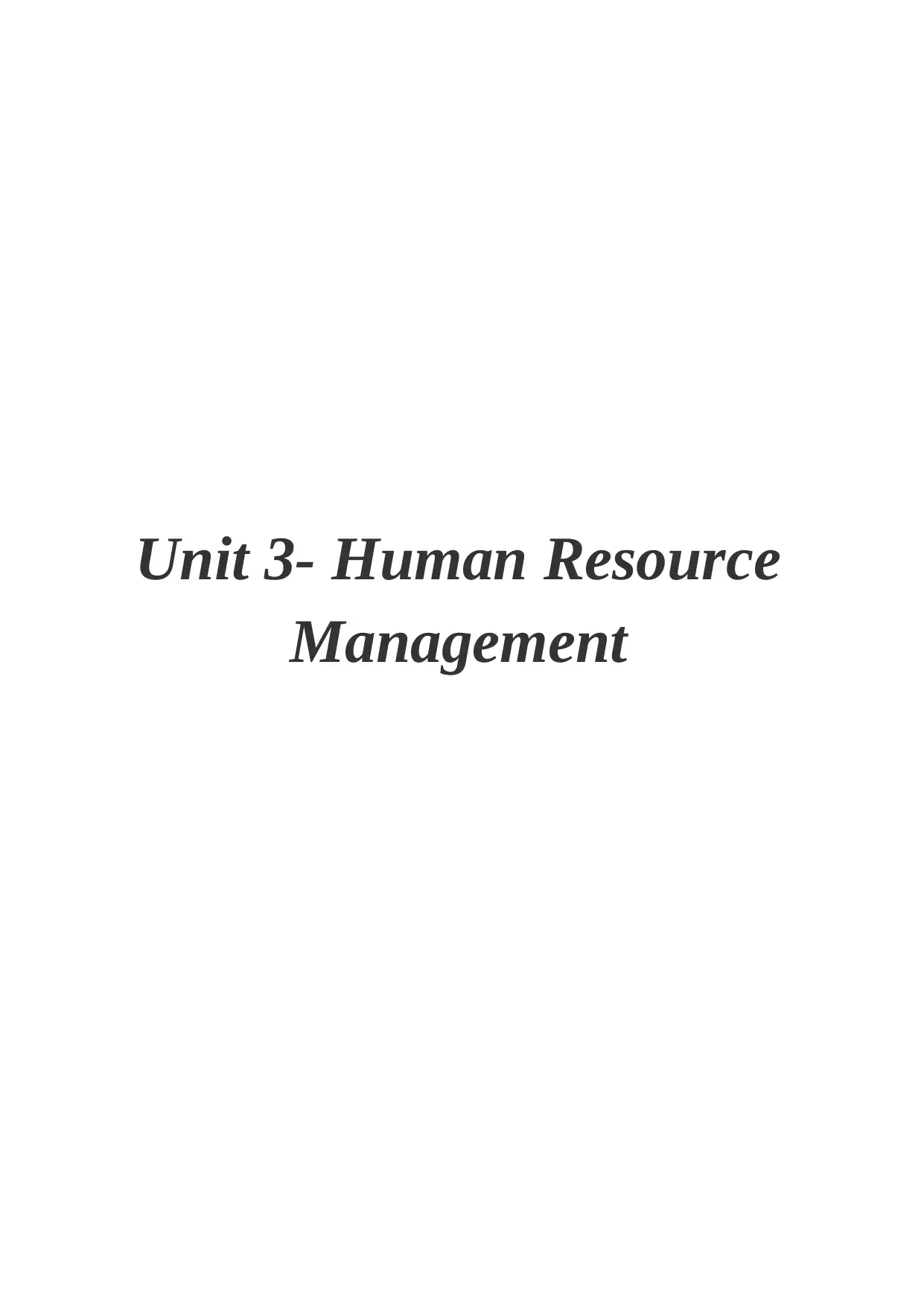
Unit 3- Human Resource
Management
Management
Paraphrase This Document
Need a fresh take? Get an instant paraphrase of this document with our AI Paraphraser
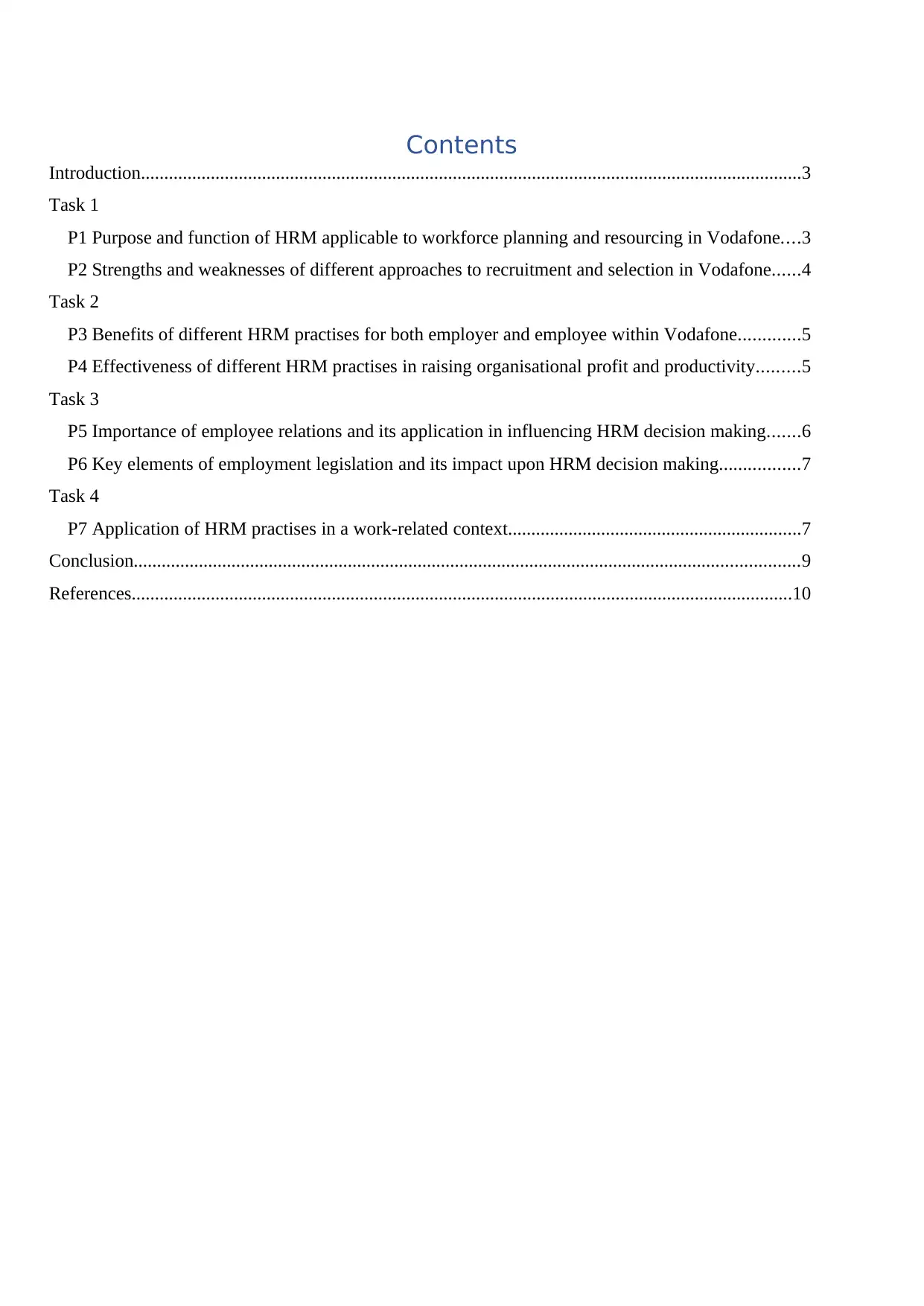
Contents
Introduction..............................................................................................................................................3
Task 1
P1 Purpose and function of HRM applicable to workforce planning and resourcing in Vodafone....3
P2 Strengths and weaknesses of different approaches to recruitment and selection in Vodafone......4
Task 2
P3 Benefits of different HRM practises for both employer and employee within Vodafone.............5
P4 Effectiveness of different HRM practises in raising organisational profit and productivity.........5
Task 3
P5 Importance of employee relations and its application in influencing HRM decision making.......6
P6 Key elements of employment legislation and its impact upon HRM decision making.................7
Task 4
P7 Application of HRM practises in a work-related context...............................................................7
Conclusion...............................................................................................................................................9
References..............................................................................................................................................10
Introduction..............................................................................................................................................3
Task 1
P1 Purpose and function of HRM applicable to workforce planning and resourcing in Vodafone....3
P2 Strengths and weaknesses of different approaches to recruitment and selection in Vodafone......4
Task 2
P3 Benefits of different HRM practises for both employer and employee within Vodafone.............5
P4 Effectiveness of different HRM practises in raising organisational profit and productivity.........5
Task 3
P5 Importance of employee relations and its application in influencing HRM decision making.......6
P6 Key elements of employment legislation and its impact upon HRM decision making.................7
Task 4
P7 Application of HRM practises in a work-related context...............................................................7
Conclusion...............................................................................................................................................9
References..............................................................................................................................................10
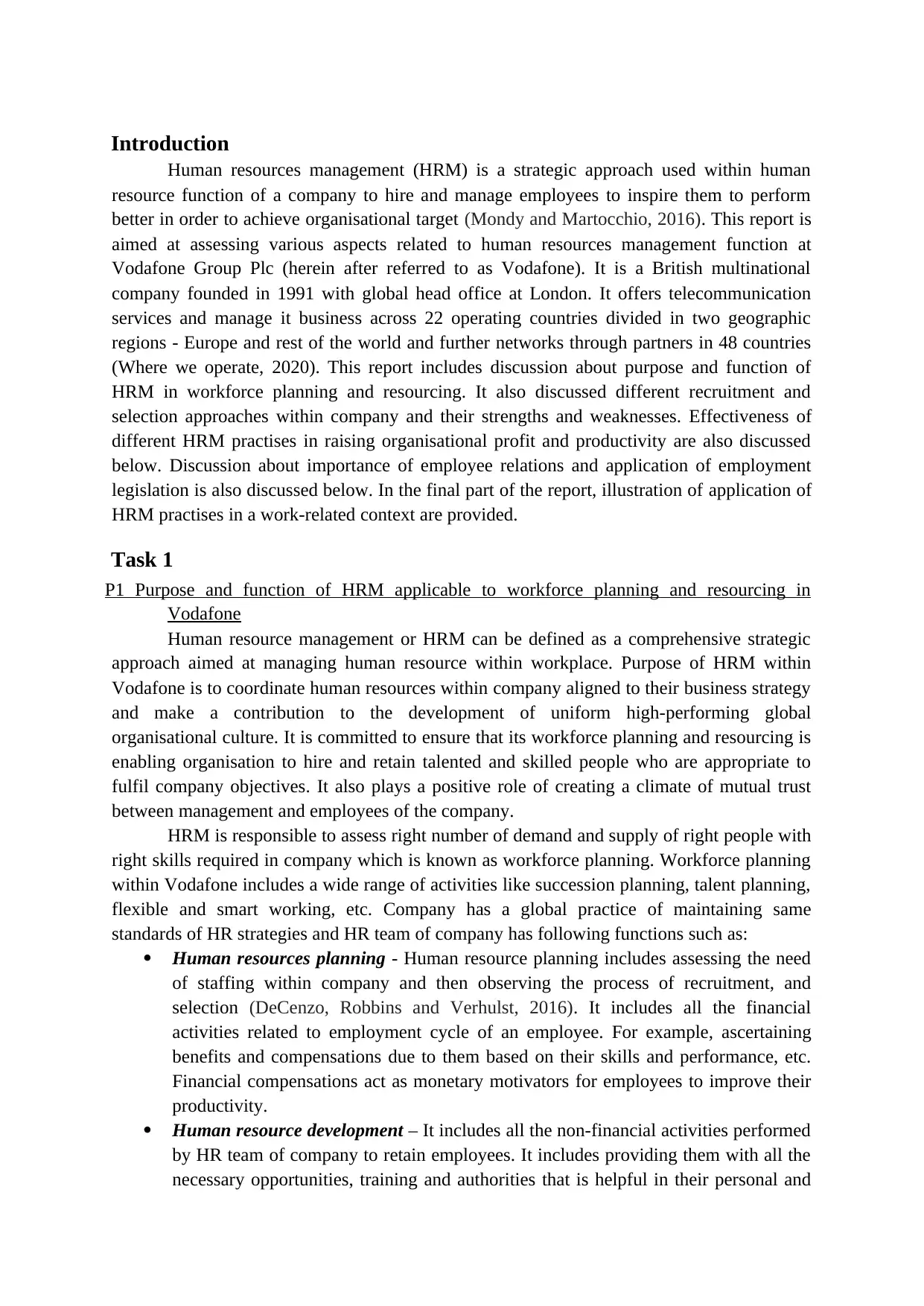
Introduction
Human resources management (HRM) is a strategic approach used within human
resource function of a company to hire and manage employees to inspire them to perform
better in order to achieve organisational target (Mondy and Martocchio, 2016). This report is
aimed at assessing various aspects related to human resources management function at
Vodafone Group Plc (herein after referred to as Vodafone). It is a British multinational
company founded in 1991 with global head office at London. It offers telecommunication
services and manage it business across 22 operating countries divided in two geographic
regions - Europe and rest of the world and further networks through partners in 48 countries
(Where we operate, 2020). This report includes discussion about purpose and function of
HRM in workforce planning and resourcing. It also discussed different recruitment and
selection approaches within company and their strengths and weaknesses. Effectiveness of
different HRM practises in raising organisational profit and productivity are also discussed
below. Discussion about importance of employee relations and application of employment
legislation is also discussed below. In the final part of the report, illustration of application of
HRM practises in a work-related context are provided.
Task 1
P1 Purpose and function of HRM applicable to workforce planning and resourcing in
Vodafone
Human resource management or HRM can be defined as a comprehensive strategic
approach aimed at managing human resource within workplace. Purpose of HRM within
Vodafone is to coordinate human resources within company aligned to their business strategy
and make a contribution to the development of uniform high-performing global
organisational culture. It is committed to ensure that its workforce planning and resourcing is
enabling organisation to hire and retain talented and skilled people who are appropriate to
fulfil company objectives. It also plays a positive role of creating a climate of mutual trust
between management and employees of the company.
HRM is responsible to assess right number of demand and supply of right people with
right skills required in company which is known as workforce planning. Workforce planning
within Vodafone includes a wide range of activities like succession planning, talent planning,
flexible and smart working, etc. Company has a global practice of maintaining same
standards of HR strategies and HR team of company has following functions such as:
Human resources planning - Human resource planning includes assessing the need
of staffing within company and then observing the process of recruitment, and
selection (DeCenzo, Robbins and Verhulst, 2016). It includes all the financial
activities related to employment cycle of an employee. For example, ascertaining
benefits and compensations due to them based on their skills and performance, etc.
Financial compensations act as monetary motivators for employees to improve their
productivity.
Human resource development – It includes all the non-financial activities performed
by HR team of company to retain employees. It includes providing them with all the
necessary opportunities, training and authorities that is helpful in their personal and
Human resources management (HRM) is a strategic approach used within human
resource function of a company to hire and manage employees to inspire them to perform
better in order to achieve organisational target (Mondy and Martocchio, 2016). This report is
aimed at assessing various aspects related to human resources management function at
Vodafone Group Plc (herein after referred to as Vodafone). It is a British multinational
company founded in 1991 with global head office at London. It offers telecommunication
services and manage it business across 22 operating countries divided in two geographic
regions - Europe and rest of the world and further networks through partners in 48 countries
(Where we operate, 2020). This report includes discussion about purpose and function of
HRM in workforce planning and resourcing. It also discussed different recruitment and
selection approaches within company and their strengths and weaknesses. Effectiveness of
different HRM practises in raising organisational profit and productivity are also discussed
below. Discussion about importance of employee relations and application of employment
legislation is also discussed below. In the final part of the report, illustration of application of
HRM practises in a work-related context are provided.
Task 1
P1 Purpose and function of HRM applicable to workforce planning and resourcing in
Vodafone
Human resource management or HRM can be defined as a comprehensive strategic
approach aimed at managing human resource within workplace. Purpose of HRM within
Vodafone is to coordinate human resources within company aligned to their business strategy
and make a contribution to the development of uniform high-performing global
organisational culture. It is committed to ensure that its workforce planning and resourcing is
enabling organisation to hire and retain talented and skilled people who are appropriate to
fulfil company objectives. It also plays a positive role of creating a climate of mutual trust
between management and employees of the company.
HRM is responsible to assess right number of demand and supply of right people with
right skills required in company which is known as workforce planning. Workforce planning
within Vodafone includes a wide range of activities like succession planning, talent planning,
flexible and smart working, etc. Company has a global practice of maintaining same
standards of HR strategies and HR team of company has following functions such as:
Human resources planning - Human resource planning includes assessing the need
of staffing within company and then observing the process of recruitment, and
selection (DeCenzo, Robbins and Verhulst, 2016). It includes all the financial
activities related to employment cycle of an employee. For example, ascertaining
benefits and compensations due to them based on their skills and performance, etc.
Financial compensations act as monetary motivators for employees to improve their
productivity.
Human resource development – It includes all the non-financial activities performed
by HR team of company to retain employees. It includes providing them with all the
necessary opportunities, training and authorities that is helpful in their personal and
⊘ This is a preview!⊘
Do you want full access?
Subscribe today to unlock all pages.

Trusted by 1+ million students worldwide
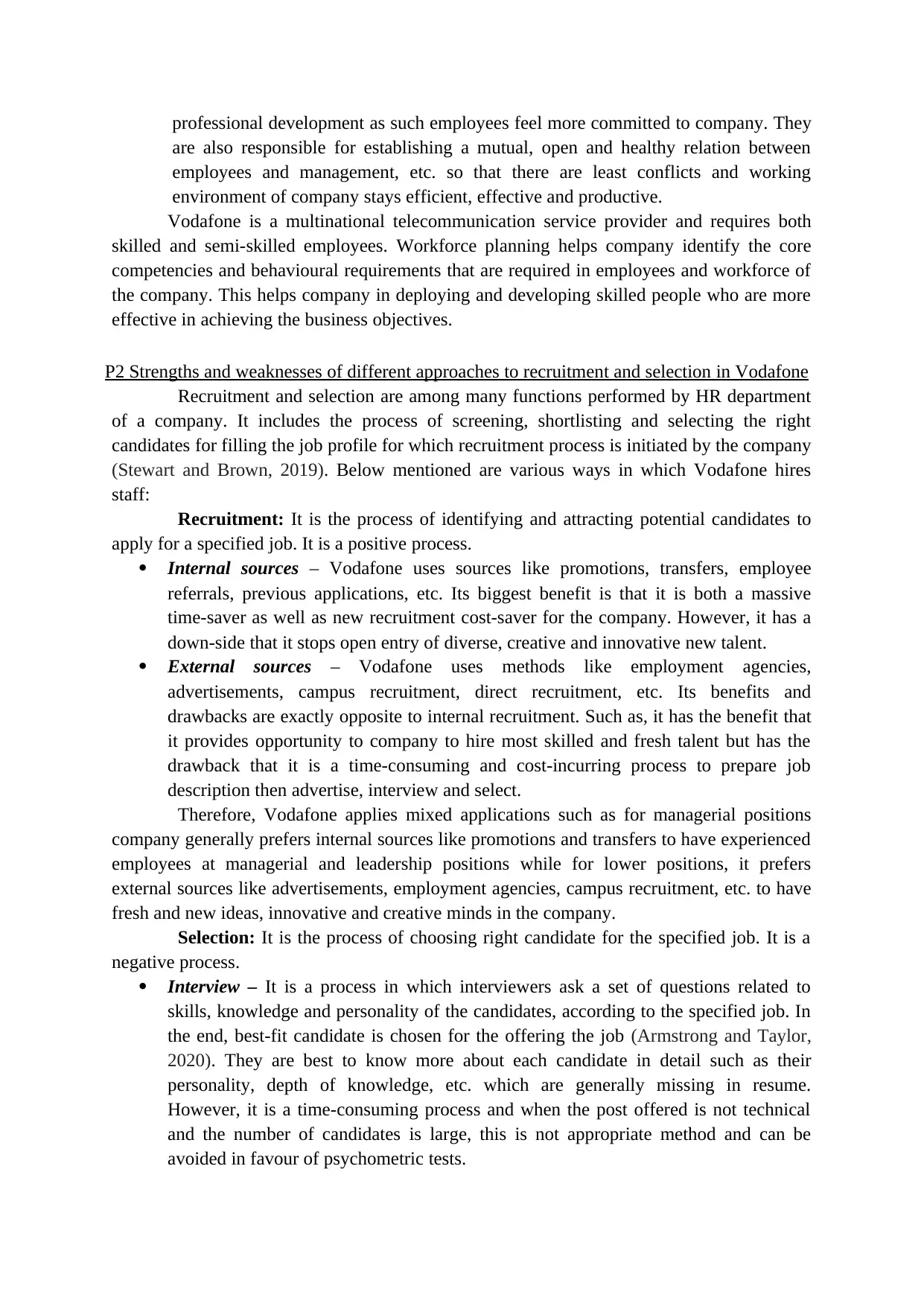
professional development as such employees feel more committed to company. They
are also responsible for establishing a mutual, open and healthy relation between
employees and management, etc. so that there are least conflicts and working
environment of company stays efficient, effective and productive.
Vodafone is a multinational telecommunication service provider and requires both
skilled and semi-skilled employees. Workforce planning helps company identify the core
competencies and behavioural requirements that are required in employees and workforce of
the company. This helps company in deploying and developing skilled people who are more
effective in achieving the business objectives.
P2 Strengths and weaknesses of different approaches to recruitment and selection in Vodafone
Recruitment and selection are among many functions performed by HR department
of a company. It includes the process of screening, shortlisting and selecting the right
candidates for filling the job profile for which recruitment process is initiated by the company
(Stewart and Brown, 2019). Below mentioned are various ways in which Vodafone hires
staff:
Recruitment: It is the process of identifying and attracting potential candidates to
apply for a specified job. It is a positive process.
Internal sources – Vodafone uses sources like promotions, transfers, employee
referrals, previous applications, etc. Its biggest benefit is that it is both a massive
time-saver as well as new recruitment cost-saver for the company. However, it has a
down-side that it stops open entry of diverse, creative and innovative new talent.
External sources – Vodafone uses methods like employment agencies,
advertisements, campus recruitment, direct recruitment, etc. Its benefits and
drawbacks are exactly opposite to internal recruitment. Such as, it has the benefit that
it provides opportunity to company to hire most skilled and fresh talent but has the
drawback that it is a time-consuming and cost-incurring process to prepare job
description then advertise, interview and select.
Therefore, Vodafone applies mixed applications such as for managerial positions
company generally prefers internal sources like promotions and transfers to have experienced
employees at managerial and leadership positions while for lower positions, it prefers
external sources like advertisements, employment agencies, campus recruitment, etc. to have
fresh and new ideas, innovative and creative minds in the company.
Selection: It is the process of choosing right candidate for the specified job. It is a
negative process.
Interview – It is a process in which interviewers ask a set of questions related to
skills, knowledge and personality of the candidates, according to the specified job. In
the end, best-fit candidate is chosen for the offering the job (Armstrong and Taylor,
2020). They are best to know more about each candidate in detail such as their
personality, depth of knowledge, etc. which are generally missing in resume.
However, it is a time-consuming process and when the post offered is not technical
and the number of candidates is large, this is not appropriate method and can be
avoided in favour of psychometric tests.
are also responsible for establishing a mutual, open and healthy relation between
employees and management, etc. so that there are least conflicts and working
environment of company stays efficient, effective and productive.
Vodafone is a multinational telecommunication service provider and requires both
skilled and semi-skilled employees. Workforce planning helps company identify the core
competencies and behavioural requirements that are required in employees and workforce of
the company. This helps company in deploying and developing skilled people who are more
effective in achieving the business objectives.
P2 Strengths and weaknesses of different approaches to recruitment and selection in Vodafone
Recruitment and selection are among many functions performed by HR department
of a company. It includes the process of screening, shortlisting and selecting the right
candidates for filling the job profile for which recruitment process is initiated by the company
(Stewart and Brown, 2019). Below mentioned are various ways in which Vodafone hires
staff:
Recruitment: It is the process of identifying and attracting potential candidates to
apply for a specified job. It is a positive process.
Internal sources – Vodafone uses sources like promotions, transfers, employee
referrals, previous applications, etc. Its biggest benefit is that it is both a massive
time-saver as well as new recruitment cost-saver for the company. However, it has a
down-side that it stops open entry of diverse, creative and innovative new talent.
External sources – Vodafone uses methods like employment agencies,
advertisements, campus recruitment, direct recruitment, etc. Its benefits and
drawbacks are exactly opposite to internal recruitment. Such as, it has the benefit that
it provides opportunity to company to hire most skilled and fresh talent but has the
drawback that it is a time-consuming and cost-incurring process to prepare job
description then advertise, interview and select.
Therefore, Vodafone applies mixed applications such as for managerial positions
company generally prefers internal sources like promotions and transfers to have experienced
employees at managerial and leadership positions while for lower positions, it prefers
external sources like advertisements, employment agencies, campus recruitment, etc. to have
fresh and new ideas, innovative and creative minds in the company.
Selection: It is the process of choosing right candidate for the specified job. It is a
negative process.
Interview – It is a process in which interviewers ask a set of questions related to
skills, knowledge and personality of the candidates, according to the specified job. In
the end, best-fit candidate is chosen for the offering the job (Armstrong and Taylor,
2020). They are best to know more about each candidate in detail such as their
personality, depth of knowledge, etc. which are generally missing in resume.
However, it is a time-consuming process and when the post offered is not technical
and the number of candidates is large, this is not appropriate method and can be
avoided in favour of psychometric tests.
Paraphrase This Document
Need a fresh take? Get an instant paraphrase of this document with our AI Paraphraser
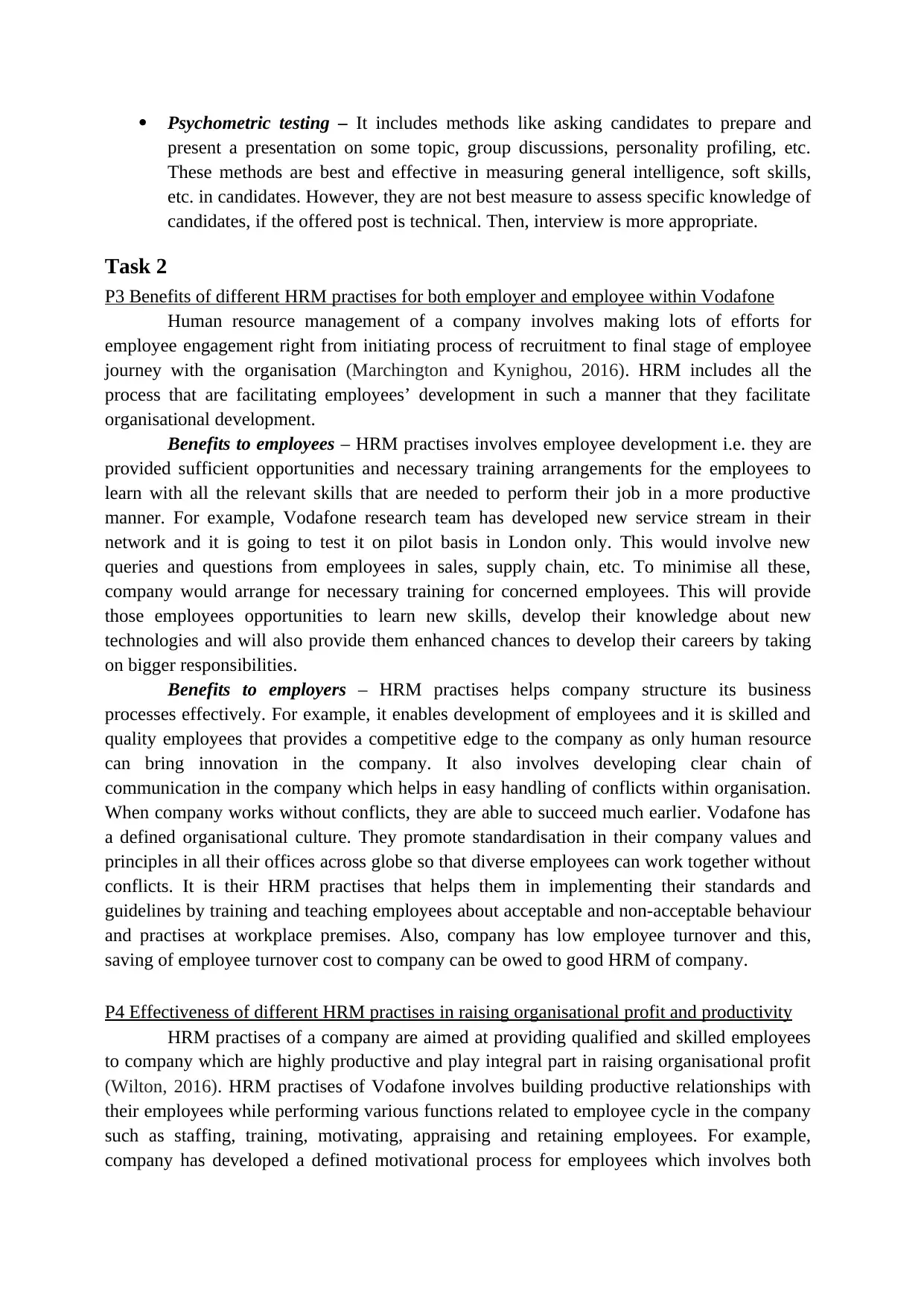
Psychometric testing – It includes methods like asking candidates to prepare and
present a presentation on some topic, group discussions, personality profiling, etc.
These methods are best and effective in measuring general intelligence, soft skills,
etc. in candidates. However, they are not best measure to assess specific knowledge of
candidates, if the offered post is technical. Then, interview is more appropriate.
Task 2
P3 Benefits of different HRM practises for both employer and employee within Vodafone
Human resource management of a company involves making lots of efforts for
employee engagement right from initiating process of recruitment to final stage of employee
journey with the organisation (Marchington and Kynighou, 2016). HRM includes all the
process that are facilitating employees’ development in such a manner that they facilitate
organisational development.
Benefits to employees – HRM practises involves employee development i.e. they are
provided sufficient opportunities and necessary training arrangements for the employees to
learn with all the relevant skills that are needed to perform their job in a more productive
manner. For example, Vodafone research team has developed new service stream in their
network and it is going to test it on pilot basis in London only. This would involve new
queries and questions from employees in sales, supply chain, etc. To minimise all these,
company would arrange for necessary training for concerned employees. This will provide
those employees opportunities to learn new skills, develop their knowledge about new
technologies and will also provide them enhanced chances to develop their careers by taking
on bigger responsibilities.
Benefits to employers – HRM practises helps company structure its business
processes effectively. For example, it enables development of employees and it is skilled and
quality employees that provides a competitive edge to the company as only human resource
can bring innovation in the company. It also involves developing clear chain of
communication in the company which helps in easy handling of conflicts within organisation.
When company works without conflicts, they are able to succeed much earlier. Vodafone has
a defined organisational culture. They promote standardisation in their company values and
principles in all their offices across globe so that diverse employees can work together without
conflicts. It is their HRM practises that helps them in implementing their standards and
guidelines by training and teaching employees about acceptable and non-acceptable behaviour
and practises at workplace premises. Also, company has low employee turnover and this,
saving of employee turnover cost to company can be owed to good HRM of company.
P4 Effectiveness of different HRM practises in raising organisational profit and productivity
HRM practises of a company are aimed at providing qualified and skilled employees
to company which are highly productive and play integral part in raising organisational profit
(Wilton, 2016). HRM practises of Vodafone involves building productive relationships with
their employees while performing various functions related to employee cycle in the company
such as staffing, training, motivating, appraising and retaining employees. For example,
company has developed a defined motivational process for employees which involves both
present a presentation on some topic, group discussions, personality profiling, etc.
These methods are best and effective in measuring general intelligence, soft skills,
etc. in candidates. However, they are not best measure to assess specific knowledge of
candidates, if the offered post is technical. Then, interview is more appropriate.
Task 2
P3 Benefits of different HRM practises for both employer and employee within Vodafone
Human resource management of a company involves making lots of efforts for
employee engagement right from initiating process of recruitment to final stage of employee
journey with the organisation (Marchington and Kynighou, 2016). HRM includes all the
process that are facilitating employees’ development in such a manner that they facilitate
organisational development.
Benefits to employees – HRM practises involves employee development i.e. they are
provided sufficient opportunities and necessary training arrangements for the employees to
learn with all the relevant skills that are needed to perform their job in a more productive
manner. For example, Vodafone research team has developed new service stream in their
network and it is going to test it on pilot basis in London only. This would involve new
queries and questions from employees in sales, supply chain, etc. To minimise all these,
company would arrange for necessary training for concerned employees. This will provide
those employees opportunities to learn new skills, develop their knowledge about new
technologies and will also provide them enhanced chances to develop their careers by taking
on bigger responsibilities.
Benefits to employers – HRM practises helps company structure its business
processes effectively. For example, it enables development of employees and it is skilled and
quality employees that provides a competitive edge to the company as only human resource
can bring innovation in the company. It also involves developing clear chain of
communication in the company which helps in easy handling of conflicts within organisation.
When company works without conflicts, they are able to succeed much earlier. Vodafone has
a defined organisational culture. They promote standardisation in their company values and
principles in all their offices across globe so that diverse employees can work together without
conflicts. It is their HRM practises that helps them in implementing their standards and
guidelines by training and teaching employees about acceptable and non-acceptable behaviour
and practises at workplace premises. Also, company has low employee turnover and this,
saving of employee turnover cost to company can be owed to good HRM of company.
P4 Effectiveness of different HRM practises in raising organisational profit and productivity
HRM practises of a company are aimed at providing qualified and skilled employees
to company which are highly productive and play integral part in raising organisational profit
(Wilton, 2016). HRM practises of Vodafone involves building productive relationships with
their employees while performing various functions related to employee cycle in the company
such as staffing, training, motivating, appraising and retaining employees. For example,
company has developed a defined motivational process for employees which involves both
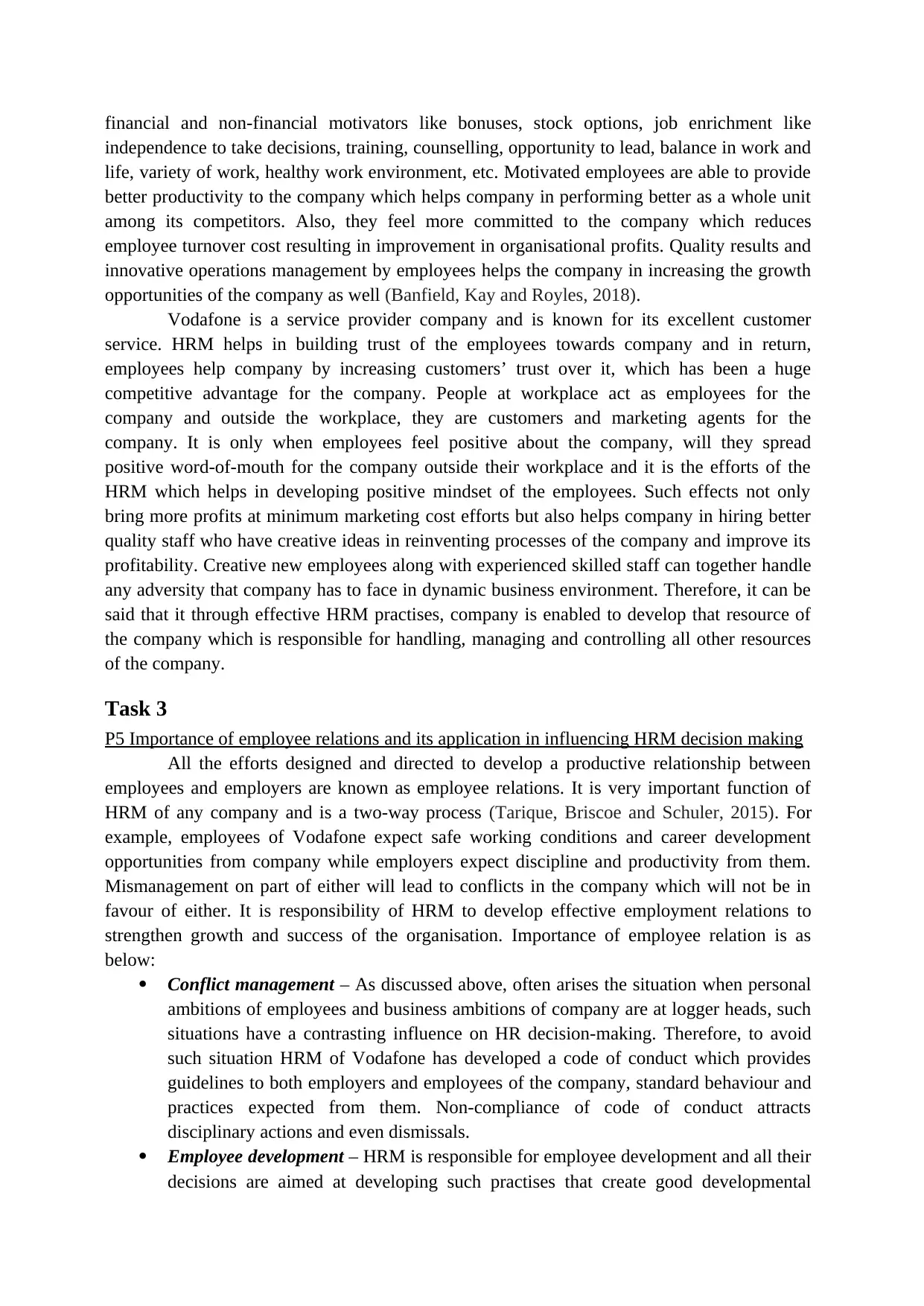
financial and non-financial motivators like bonuses, stock options, job enrichment like
independence to take decisions, training, counselling, opportunity to lead, balance in work and
life, variety of work, healthy work environment, etc. Motivated employees are able to provide
better productivity to the company which helps company in performing better as a whole unit
among its competitors. Also, they feel more committed to the company which reduces
employee turnover cost resulting in improvement in organisational profits. Quality results and
innovative operations management by employees helps the company in increasing the growth
opportunities of the company as well (Banfield, Kay and Royles, 2018).
Vodafone is a service provider company and is known for its excellent customer
service. HRM helps in building trust of the employees towards company and in return,
employees help company by increasing customers’ trust over it, which has been a huge
competitive advantage for the company. People at workplace act as employees for the
company and outside the workplace, they are customers and marketing agents for the
company. It is only when employees feel positive about the company, will they spread
positive word-of-mouth for the company outside their workplace and it is the efforts of the
HRM which helps in developing positive mindset of the employees. Such effects not only
bring more profits at minimum marketing cost efforts but also helps company in hiring better
quality staff who have creative ideas in reinventing processes of the company and improve its
profitability. Creative new employees along with experienced skilled staff can together handle
any adversity that company has to face in dynamic business environment. Therefore, it can be
said that it through effective HRM practises, company is enabled to develop that resource of
the company which is responsible for handling, managing and controlling all other resources
of the company.
Task 3
P5 Importance of employee relations and its application in influencing HRM decision making
All the efforts designed and directed to develop a productive relationship between
employees and employers are known as employee relations. It is very important function of
HRM of any company and is a two-way process (Tarique, Briscoe and Schuler, 2015). For
example, employees of Vodafone expect safe working conditions and career development
opportunities from company while employers expect discipline and productivity from them.
Mismanagement on part of either will lead to conflicts in the company which will not be in
favour of either. It is responsibility of HRM to develop effective employment relations to
strengthen growth and success of the organisation. Importance of employee relation is as
below:
Conflict management – As discussed above, often arises the situation when personal
ambitions of employees and business ambitions of company are at logger heads, such
situations have a contrasting influence on HR decision-making. Therefore, to avoid
such situation HRM of Vodafone has developed a code of conduct which provides
guidelines to both employers and employees of the company, standard behaviour and
practices expected from them. Non-compliance of code of conduct attracts
disciplinary actions and even dismissals.
Employee development – HRM is responsible for employee development and all their
decisions are aimed at developing such practises that create good developmental
independence to take decisions, training, counselling, opportunity to lead, balance in work and
life, variety of work, healthy work environment, etc. Motivated employees are able to provide
better productivity to the company which helps company in performing better as a whole unit
among its competitors. Also, they feel more committed to the company which reduces
employee turnover cost resulting in improvement in organisational profits. Quality results and
innovative operations management by employees helps the company in increasing the growth
opportunities of the company as well (Banfield, Kay and Royles, 2018).
Vodafone is a service provider company and is known for its excellent customer
service. HRM helps in building trust of the employees towards company and in return,
employees help company by increasing customers’ trust over it, which has been a huge
competitive advantage for the company. People at workplace act as employees for the
company and outside the workplace, they are customers and marketing agents for the
company. It is only when employees feel positive about the company, will they spread
positive word-of-mouth for the company outside their workplace and it is the efforts of the
HRM which helps in developing positive mindset of the employees. Such effects not only
bring more profits at minimum marketing cost efforts but also helps company in hiring better
quality staff who have creative ideas in reinventing processes of the company and improve its
profitability. Creative new employees along with experienced skilled staff can together handle
any adversity that company has to face in dynamic business environment. Therefore, it can be
said that it through effective HRM practises, company is enabled to develop that resource of
the company which is responsible for handling, managing and controlling all other resources
of the company.
Task 3
P5 Importance of employee relations and its application in influencing HRM decision making
All the efforts designed and directed to develop a productive relationship between
employees and employers are known as employee relations. It is very important function of
HRM of any company and is a two-way process (Tarique, Briscoe and Schuler, 2015). For
example, employees of Vodafone expect safe working conditions and career development
opportunities from company while employers expect discipline and productivity from them.
Mismanagement on part of either will lead to conflicts in the company which will not be in
favour of either. It is responsibility of HRM to develop effective employment relations to
strengthen growth and success of the organisation. Importance of employee relation is as
below:
Conflict management – As discussed above, often arises the situation when personal
ambitions of employees and business ambitions of company are at logger heads, such
situations have a contrasting influence on HR decision-making. Therefore, to avoid
such situation HRM of Vodafone has developed a code of conduct which provides
guidelines to both employers and employees of the company, standard behaviour and
practices expected from them. Non-compliance of code of conduct attracts
disciplinary actions and even dismissals.
Employee development – HRM is responsible for employee development and all their
decisions are aimed at developing such practises that create good developmental
⊘ This is a preview!⊘
Do you want full access?
Subscribe today to unlock all pages.

Trusted by 1+ million students worldwide
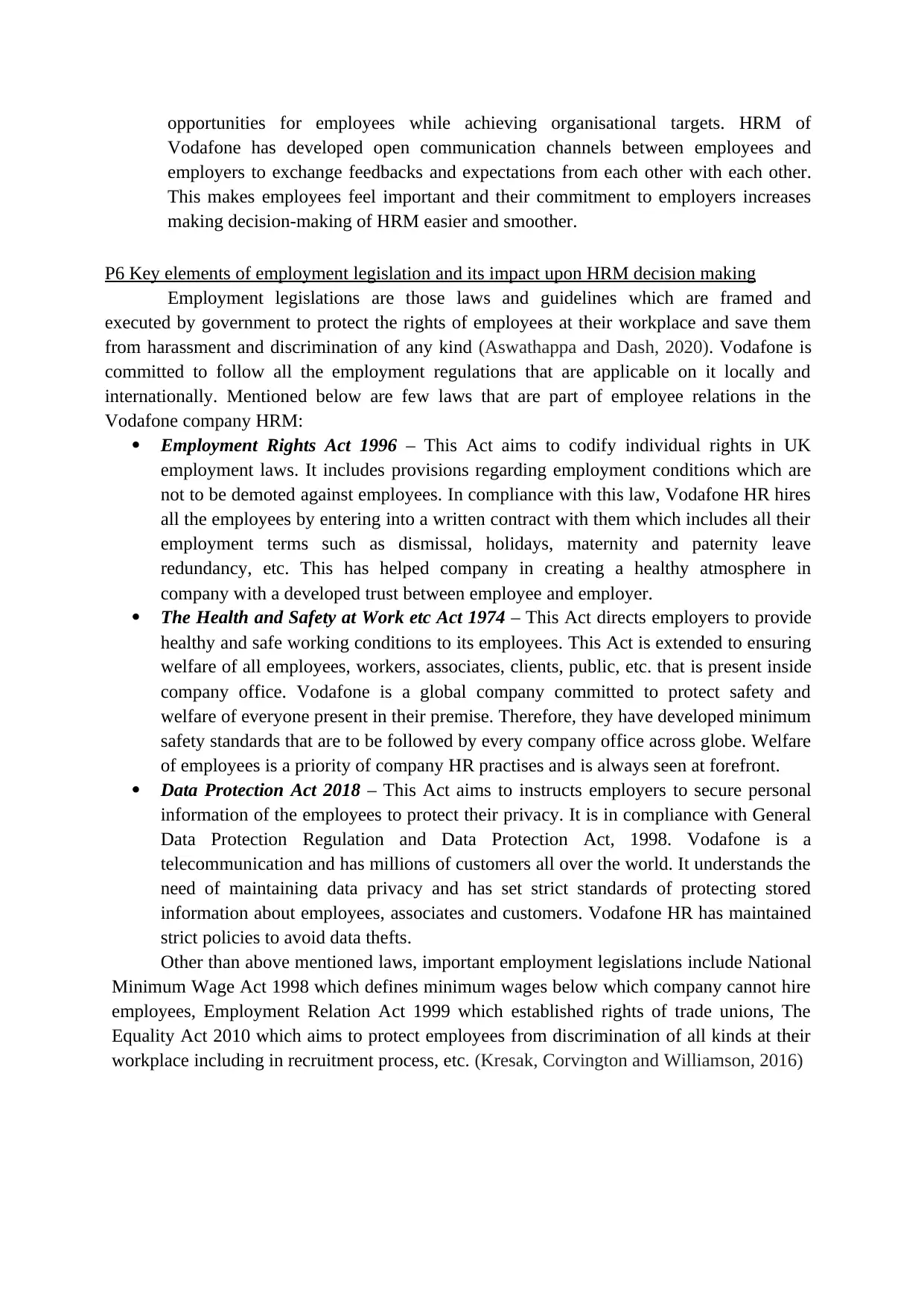
opportunities for employees while achieving organisational targets. HRM of
Vodafone has developed open communication channels between employees and
employers to exchange feedbacks and expectations from each other with each other.
This makes employees feel important and their commitment to employers increases
making decision-making of HRM easier and smoother.
P6 Key elements of employment legislation and its impact upon HRM decision making
Employment legislations are those laws and guidelines which are framed and
executed by government to protect the rights of employees at their workplace and save them
from harassment and discrimination of any kind (Aswathappa and Dash, 2020). Vodafone is
committed to follow all the employment regulations that are applicable on it locally and
internationally. Mentioned below are few laws that are part of employee relations in the
Vodafone company HRM:
Employment Rights Act 1996 – This Act aims to codify individual rights in UK
employment laws. It includes provisions regarding employment conditions which are
not to be demoted against employees. In compliance with this law, Vodafone HR hires
all the employees by entering into a written contract with them which includes all their
employment terms such as dismissal, holidays, maternity and paternity leave
redundancy, etc. This has helped company in creating a healthy atmosphere in
company with a developed trust between employee and employer.
The Health and Safety at Work etc Act 1974 – This Act directs employers to provide
healthy and safe working conditions to its employees. This Act is extended to ensuring
welfare of all employees, workers, associates, clients, public, etc. that is present inside
company office. Vodafone is a global company committed to protect safety and
welfare of everyone present in their premise. Therefore, they have developed minimum
safety standards that are to be followed by every company office across globe. Welfare
of employees is a priority of company HR practises and is always seen at forefront.
Data Protection Act 2018 – This Act aims to instructs employers to secure personal
information of the employees to protect their privacy. It is in compliance with General
Data Protection Regulation and Data Protection Act, 1998. Vodafone is a
telecommunication and has millions of customers all over the world. It understands the
need of maintaining data privacy and has set strict standards of protecting stored
information about employees, associates and customers. Vodafone HR has maintained
strict policies to avoid data thefts.
Other than above mentioned laws, important employment legislations include National
Minimum Wage Act 1998 which defines minimum wages below which company cannot hire
employees, Employment Relation Act 1999 which established rights of trade unions, The
Equality Act 2010 which aims to protect employees from discrimination of all kinds at their
workplace including in recruitment process, etc. (Kresak, Corvington and Williamson, 2016)
Vodafone has developed open communication channels between employees and
employers to exchange feedbacks and expectations from each other with each other.
This makes employees feel important and their commitment to employers increases
making decision-making of HRM easier and smoother.
P6 Key elements of employment legislation and its impact upon HRM decision making
Employment legislations are those laws and guidelines which are framed and
executed by government to protect the rights of employees at their workplace and save them
from harassment and discrimination of any kind (Aswathappa and Dash, 2020). Vodafone is
committed to follow all the employment regulations that are applicable on it locally and
internationally. Mentioned below are few laws that are part of employee relations in the
Vodafone company HRM:
Employment Rights Act 1996 – This Act aims to codify individual rights in UK
employment laws. It includes provisions regarding employment conditions which are
not to be demoted against employees. In compliance with this law, Vodafone HR hires
all the employees by entering into a written contract with them which includes all their
employment terms such as dismissal, holidays, maternity and paternity leave
redundancy, etc. This has helped company in creating a healthy atmosphere in
company with a developed trust between employee and employer.
The Health and Safety at Work etc Act 1974 – This Act directs employers to provide
healthy and safe working conditions to its employees. This Act is extended to ensuring
welfare of all employees, workers, associates, clients, public, etc. that is present inside
company office. Vodafone is a global company committed to protect safety and
welfare of everyone present in their premise. Therefore, they have developed minimum
safety standards that are to be followed by every company office across globe. Welfare
of employees is a priority of company HR practises and is always seen at forefront.
Data Protection Act 2018 – This Act aims to instructs employers to secure personal
information of the employees to protect their privacy. It is in compliance with General
Data Protection Regulation and Data Protection Act, 1998. Vodafone is a
telecommunication and has millions of customers all over the world. It understands the
need of maintaining data privacy and has set strict standards of protecting stored
information about employees, associates and customers. Vodafone HR has maintained
strict policies to avoid data thefts.
Other than above mentioned laws, important employment legislations include National
Minimum Wage Act 1998 which defines minimum wages below which company cannot hire
employees, Employment Relation Act 1999 which established rights of trade unions, The
Equality Act 2010 which aims to protect employees from discrimination of all kinds at their
workplace including in recruitment process, etc. (Kresak, Corvington and Williamson, 2016)
Paraphrase This Document
Need a fresh take? Get an instant paraphrase of this document with our AI Paraphraser
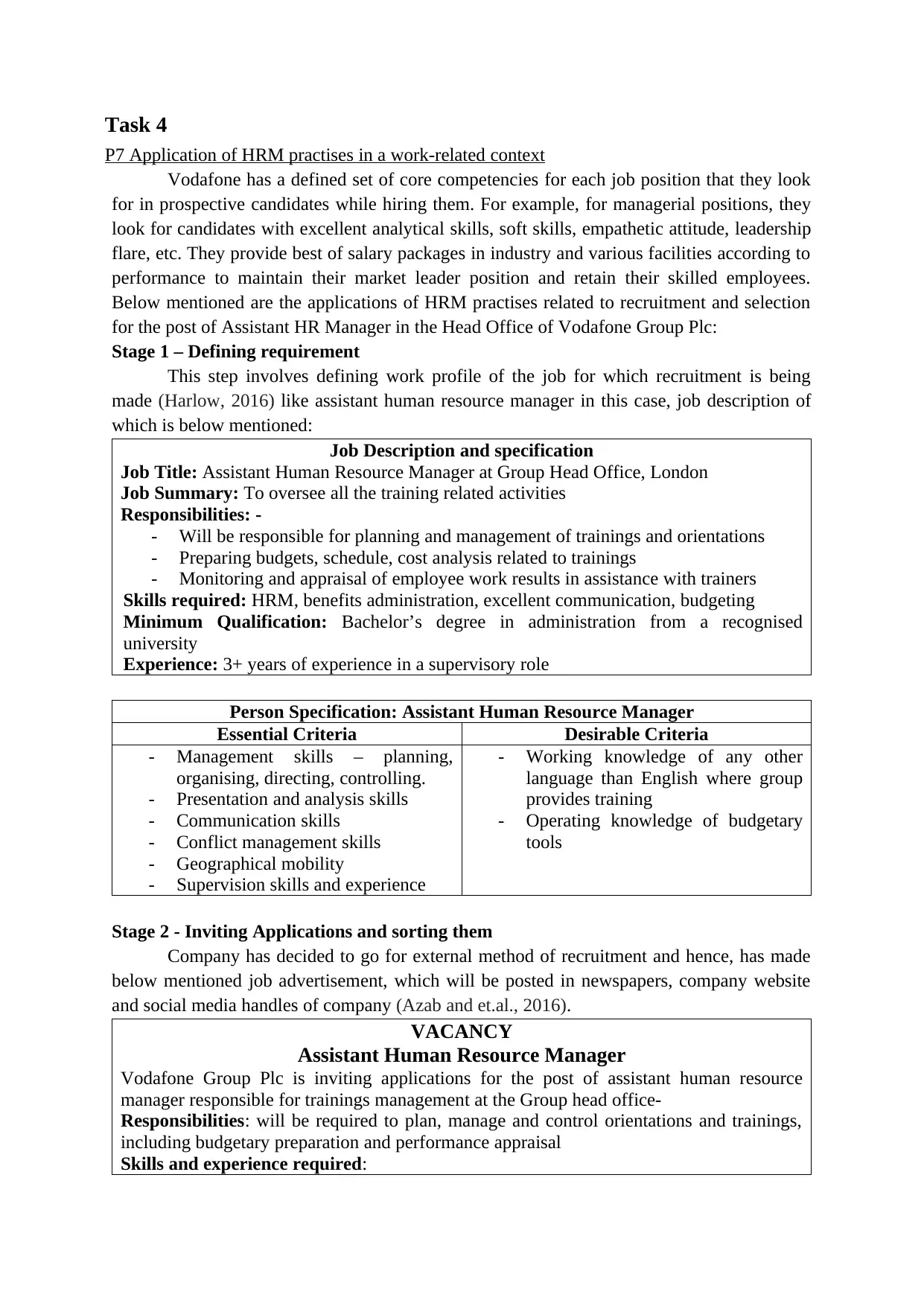
Task 4
P7 Application of HRM practises in a work-related context
Vodafone has a defined set of core competencies for each job position that they look
for in prospective candidates while hiring them. For example, for managerial positions, they
look for candidates with excellent analytical skills, soft skills, empathetic attitude, leadership
flare, etc. They provide best of salary packages in industry and various facilities according to
performance to maintain their market leader position and retain their skilled employees.
Below mentioned are the applications of HRM practises related to recruitment and selection
for the post of Assistant HR Manager in the Head Office of Vodafone Group Plc:
Stage 1 – Defining requirement
This step involves defining work profile of the job for which recruitment is being
made (Harlow, 2016) like assistant human resource manager in this case, job description of
which is below mentioned:
Job Description and specification
Job Title: Assistant Human Resource Manager at Group Head Office, London
Job Summary: To oversee all the training related activities
Responsibilities: -
- Will be responsible for planning and management of trainings and orientations
- Preparing budgets, schedule, cost analysis related to trainings
- Monitoring and appraisal of employee work results in assistance with trainers
Skills required: HRM, benefits administration, excellent communication, budgeting
Minimum Qualification: Bachelor’s degree in administration from a recognised
university
Experience: 3+ years of experience in a supervisory role
Person Specification: Assistant Human Resource Manager
Essential Criteria Desirable Criteria
- Management skills – planning,
organising, directing, controlling.
- Presentation and analysis skills
- Communication skills
- Conflict management skills
- Geographical mobility
- Supervision skills and experience
- Working knowledge of any other
language than English where group
provides training
- Operating knowledge of budgetary
tools
Stage 2 - Inviting Applications and sorting them
Company has decided to go for external method of recruitment and hence, has made
below mentioned job advertisement, which will be posted in newspapers, company website
and social media handles of company (Azab and et.al., 2016).
VACANCY
Assistant Human Resource Manager
Vodafone Group Plc is inviting applications for the post of assistant human resource
manager responsible for trainings management at the Group head office-
Responsibilities: will be required to plan, manage and control orientations and trainings,
including budgetary preparation and performance appraisal
Skills and experience required:
P7 Application of HRM practises in a work-related context
Vodafone has a defined set of core competencies for each job position that they look
for in prospective candidates while hiring them. For example, for managerial positions, they
look for candidates with excellent analytical skills, soft skills, empathetic attitude, leadership
flare, etc. They provide best of salary packages in industry and various facilities according to
performance to maintain their market leader position and retain their skilled employees.
Below mentioned are the applications of HRM practises related to recruitment and selection
for the post of Assistant HR Manager in the Head Office of Vodafone Group Plc:
Stage 1 – Defining requirement
This step involves defining work profile of the job for which recruitment is being
made (Harlow, 2016) like assistant human resource manager in this case, job description of
which is below mentioned:
Job Description and specification
Job Title: Assistant Human Resource Manager at Group Head Office, London
Job Summary: To oversee all the training related activities
Responsibilities: -
- Will be responsible for planning and management of trainings and orientations
- Preparing budgets, schedule, cost analysis related to trainings
- Monitoring and appraisal of employee work results in assistance with trainers
Skills required: HRM, benefits administration, excellent communication, budgeting
Minimum Qualification: Bachelor’s degree in administration from a recognised
university
Experience: 3+ years of experience in a supervisory role
Person Specification: Assistant Human Resource Manager
Essential Criteria Desirable Criteria
- Management skills – planning,
organising, directing, controlling.
- Presentation and analysis skills
- Communication skills
- Conflict management skills
- Geographical mobility
- Supervision skills and experience
- Working knowledge of any other
language than English where group
provides training
- Operating knowledge of budgetary
tools
Stage 2 - Inviting Applications and sorting them
Company has decided to go for external method of recruitment and hence, has made
below mentioned job advertisement, which will be posted in newspapers, company website
and social media handles of company (Azab and et.al., 2016).
VACANCY
Assistant Human Resource Manager
Vodafone Group Plc is inviting applications for the post of assistant human resource
manager responsible for trainings management at the Group head office-
Responsibilities: will be required to plan, manage and control orientations and trainings,
including budgetary preparation and performance appraisal
Skills and experience required:
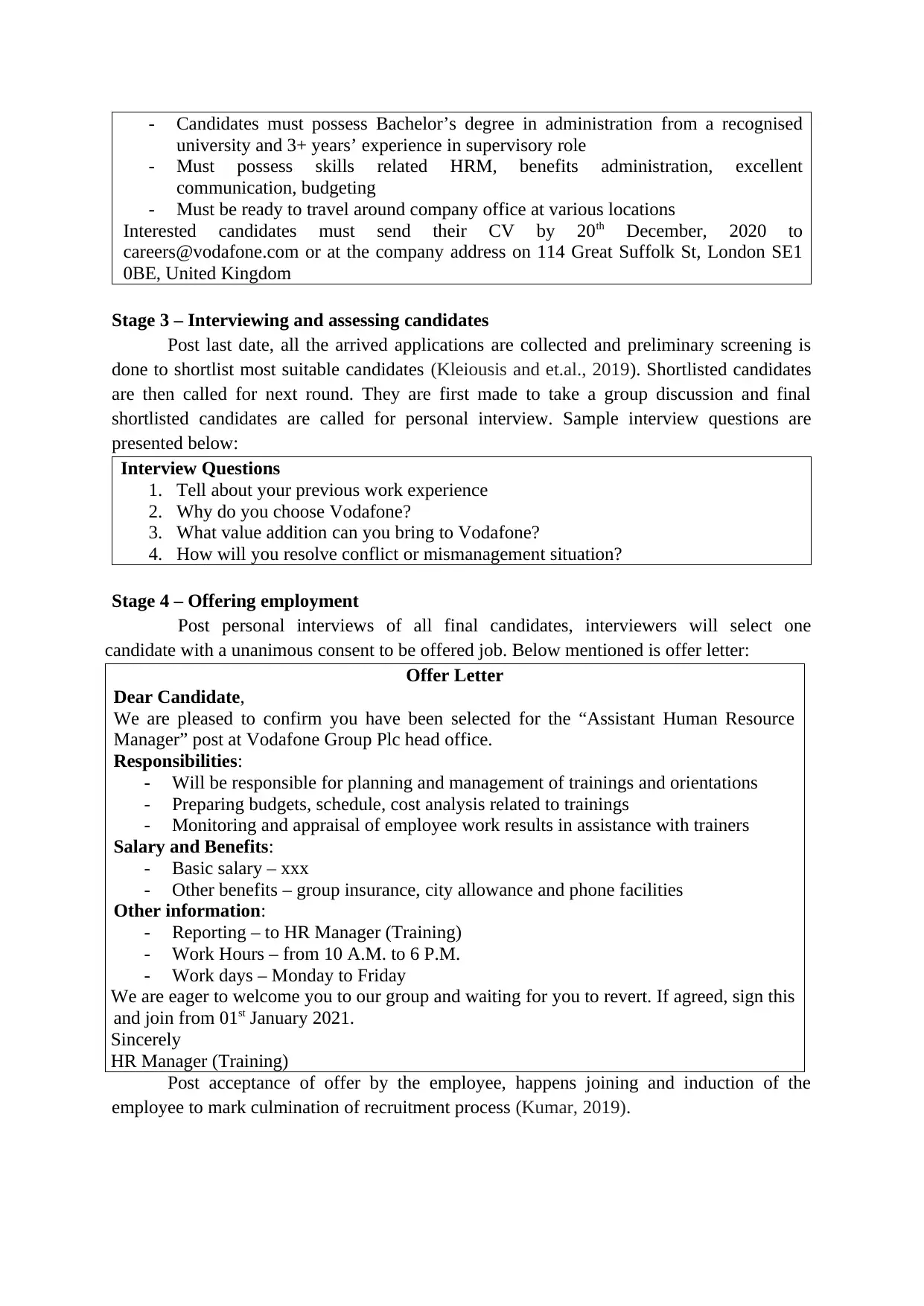
- Candidates must possess Bachelor’s degree in administration from a recognised
university and 3+ years’ experience in supervisory role
- Must possess skills related HRM, benefits administration, excellent
communication, budgeting
- Must be ready to travel around company office at various locations
Interested candidates must send their CV by 20th December, 2020 to
careers@vodafone.com or at the company address on 114 Great Suffolk St, London SE1
0BE, United Kingdom
Stage 3 – Interviewing and assessing candidates
Post last date, all the arrived applications are collected and preliminary screening is
done to shortlist most suitable candidates (Kleiousis and et.al., 2019). Shortlisted candidates
are then called for next round. They are first made to take a group discussion and final
shortlisted candidates are called for personal interview. Sample interview questions are
presented below:
Interview Questions
1. Tell about your previous work experience
2. Why do you choose Vodafone?
3. What value addition can you bring to Vodafone?
4. How will you resolve conflict or mismanagement situation?
Stage 4 – Offering employment
Post personal interviews of all final candidates, interviewers will select one
candidate with a unanimous consent to be offered job. Below mentioned is offer letter:
Offer Letter
Dear Candidate,
We are pleased to confirm you have been selected for the “Assistant Human Resource
Manager” post at Vodafone Group Plc head office.
Responsibilities:
- Will be responsible for planning and management of trainings and orientations
- Preparing budgets, schedule, cost analysis related to trainings
- Monitoring and appraisal of employee work results in assistance with trainers
Salary and Benefits:
- Basic salary – xxx
- Other benefits – group insurance, city allowance and phone facilities
Other information:
- Reporting – to HR Manager (Training)
- Work Hours – from 10 A.M. to 6 P.M.
- Work days – Monday to Friday
We are eager to welcome you to our group and waiting for you to revert. If agreed, sign this
and join from 01st January 2021.
Sincerely
HR Manager (Training)
Post acceptance of offer by the employee, happens joining and induction of the
employee to mark culmination of recruitment process (Kumar, 2019).
university and 3+ years’ experience in supervisory role
- Must possess skills related HRM, benefits administration, excellent
communication, budgeting
- Must be ready to travel around company office at various locations
Interested candidates must send their CV by 20th December, 2020 to
careers@vodafone.com or at the company address on 114 Great Suffolk St, London SE1
0BE, United Kingdom
Stage 3 – Interviewing and assessing candidates
Post last date, all the arrived applications are collected and preliminary screening is
done to shortlist most suitable candidates (Kleiousis and et.al., 2019). Shortlisted candidates
are then called for next round. They are first made to take a group discussion and final
shortlisted candidates are called for personal interview. Sample interview questions are
presented below:
Interview Questions
1. Tell about your previous work experience
2. Why do you choose Vodafone?
3. What value addition can you bring to Vodafone?
4. How will you resolve conflict or mismanagement situation?
Stage 4 – Offering employment
Post personal interviews of all final candidates, interviewers will select one
candidate with a unanimous consent to be offered job. Below mentioned is offer letter:
Offer Letter
Dear Candidate,
We are pleased to confirm you have been selected for the “Assistant Human Resource
Manager” post at Vodafone Group Plc head office.
Responsibilities:
- Will be responsible for planning and management of trainings and orientations
- Preparing budgets, schedule, cost analysis related to trainings
- Monitoring and appraisal of employee work results in assistance with trainers
Salary and Benefits:
- Basic salary – xxx
- Other benefits – group insurance, city allowance and phone facilities
Other information:
- Reporting – to HR Manager (Training)
- Work Hours – from 10 A.M. to 6 P.M.
- Work days – Monday to Friday
We are eager to welcome you to our group and waiting for you to revert. If agreed, sign this
and join from 01st January 2021.
Sincerely
HR Manager (Training)
Post acceptance of offer by the employee, happens joining and induction of the
employee to mark culmination of recruitment process (Kumar, 2019).
⊘ This is a preview!⊘
Do you want full access?
Subscribe today to unlock all pages.

Trusted by 1+ million students worldwide
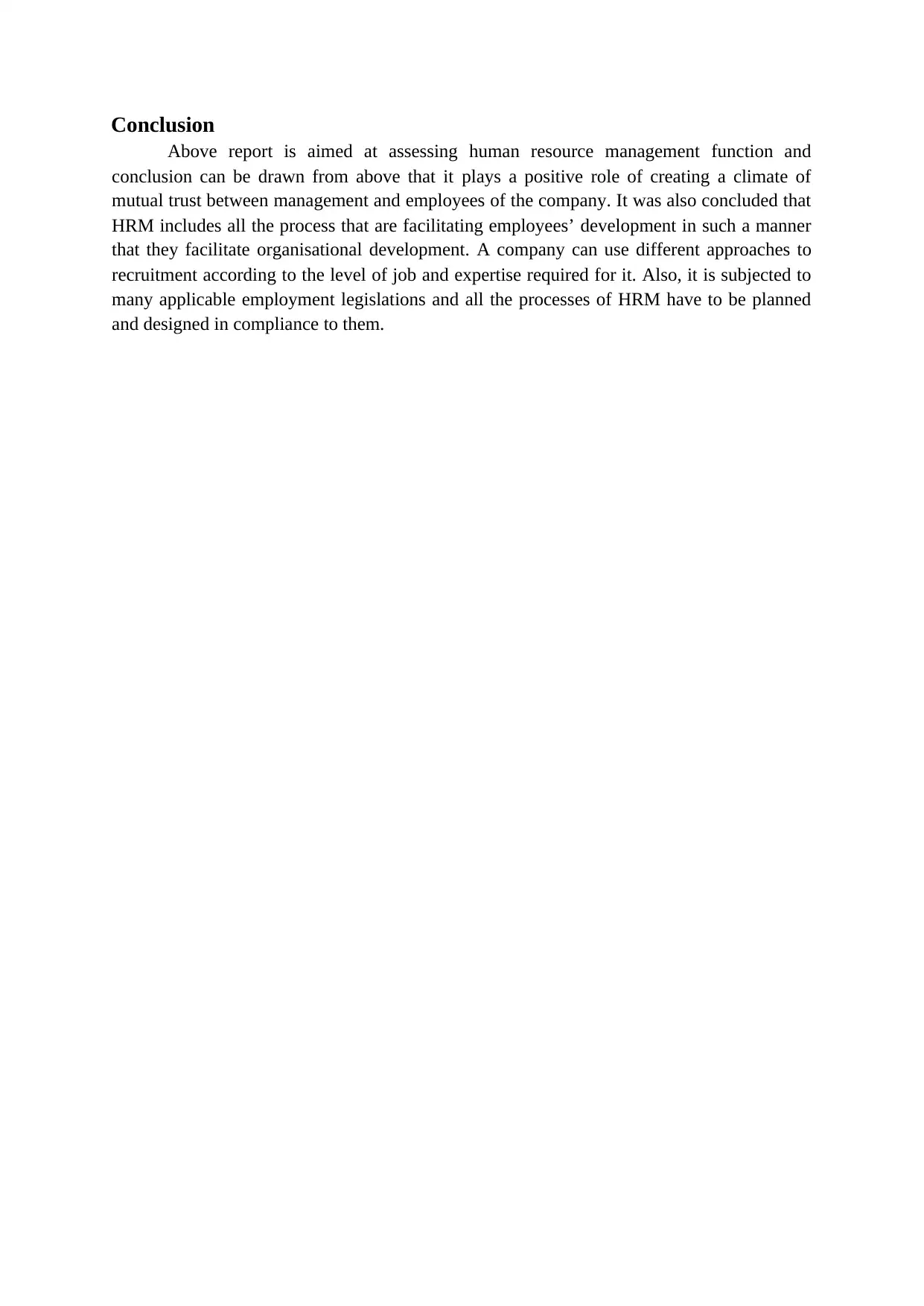
Conclusion
Above report is aimed at assessing human resource management function and
conclusion can be drawn from above that it plays a positive role of creating a climate of
mutual trust between management and employees of the company. It was also concluded that
HRM includes all the process that are facilitating employees’ development in such a manner
that they facilitate organisational development. A company can use different approaches to
recruitment according to the level of job and expertise required for it. Also, it is subjected to
many applicable employment legislations and all the processes of HRM have to be planned
and designed in compliance to them.
Above report is aimed at assessing human resource management function and
conclusion can be drawn from above that it plays a positive role of creating a climate of
mutual trust between management and employees of the company. It was also concluded that
HRM includes all the process that are facilitating employees’ development in such a manner
that they facilitate organisational development. A company can use different approaches to
recruitment according to the level of job and expertise required for it. Also, it is subjected to
many applicable employment legislations and all the processes of HRM have to be planned
and designed in compliance to them.
Paraphrase This Document
Need a fresh take? Get an instant paraphrase of this document with our AI Paraphraser
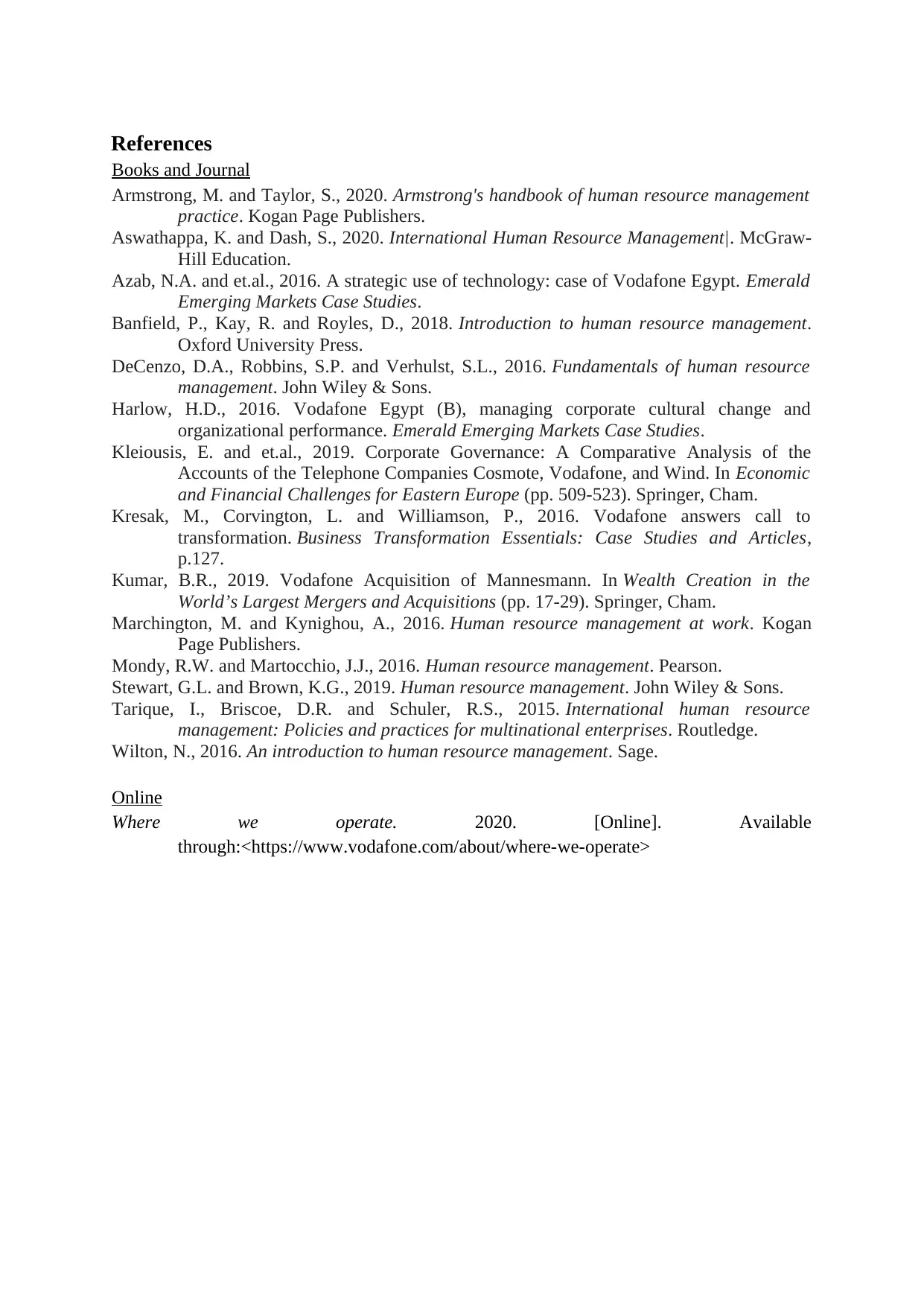
References
Books and Journal
Armstrong, M. and Taylor, S., 2020. Armstrong's handbook of human resource management
practice. Kogan Page Publishers.
Aswathappa, K. and Dash, S., 2020. International Human Resource Management|. McGraw-
Hill Education.
Azab, N.A. and et.al., 2016. A strategic use of technology: case of Vodafone Egypt. Emerald
Emerging Markets Case Studies.
Banfield, P., Kay, R. and Royles, D., 2018. Introduction to human resource management.
Oxford University Press.
DeCenzo, D.A., Robbins, S.P. and Verhulst, S.L., 2016. Fundamentals of human resource
management. John Wiley & Sons.
Harlow, H.D., 2016. Vodafone Egypt (B), managing corporate cultural change and
organizational performance. Emerald Emerging Markets Case Studies.
Kleiousis, E. and et.al., 2019. Corporate Governance: A Comparative Analysis of the
Accounts of the Telephone Companies Cosmote, Vodafone, and Wind. In Economic
and Financial Challenges for Eastern Europe (pp. 509-523). Springer, Cham.
Kresak, M., Corvington, L. and Williamson, P., 2016. Vodafone answers call to
transformation. Business Transformation Essentials: Case Studies and Articles,
p.127.
Kumar, B.R., 2019. Vodafone Acquisition of Mannesmann. In Wealth Creation in the
World’s Largest Mergers and Acquisitions (pp. 17-29). Springer, Cham.
Marchington, M. and Kynighou, A., 2016. Human resource management at work. Kogan
Page Publishers.
Mondy, R.W. and Martocchio, J.J., 2016. Human resource management. Pearson.
Stewart, G.L. and Brown, K.G., 2019. Human resource management. John Wiley & Sons.
Tarique, I., Briscoe, D.R. and Schuler, R.S., 2015. International human resource
management: Policies and practices for multinational enterprises. Routledge.
Wilton, N., 2016. An introduction to human resource management. Sage.
Online
Where we operate. 2020. [Online]. Available
through:<https://www.vodafone.com/about/where-we-operate>
Books and Journal
Armstrong, M. and Taylor, S., 2020. Armstrong's handbook of human resource management
practice. Kogan Page Publishers.
Aswathappa, K. and Dash, S., 2020. International Human Resource Management|. McGraw-
Hill Education.
Azab, N.A. and et.al., 2016. A strategic use of technology: case of Vodafone Egypt. Emerald
Emerging Markets Case Studies.
Banfield, P., Kay, R. and Royles, D., 2018. Introduction to human resource management.
Oxford University Press.
DeCenzo, D.A., Robbins, S.P. and Verhulst, S.L., 2016. Fundamentals of human resource
management. John Wiley & Sons.
Harlow, H.D., 2016. Vodafone Egypt (B), managing corporate cultural change and
organizational performance. Emerald Emerging Markets Case Studies.
Kleiousis, E. and et.al., 2019. Corporate Governance: A Comparative Analysis of the
Accounts of the Telephone Companies Cosmote, Vodafone, and Wind. In Economic
and Financial Challenges for Eastern Europe (pp. 509-523). Springer, Cham.
Kresak, M., Corvington, L. and Williamson, P., 2016. Vodafone answers call to
transformation. Business Transformation Essentials: Case Studies and Articles,
p.127.
Kumar, B.R., 2019. Vodafone Acquisition of Mannesmann. In Wealth Creation in the
World’s Largest Mergers and Acquisitions (pp. 17-29). Springer, Cham.
Marchington, M. and Kynighou, A., 2016. Human resource management at work. Kogan
Page Publishers.
Mondy, R.W. and Martocchio, J.J., 2016. Human resource management. Pearson.
Stewart, G.L. and Brown, K.G., 2019. Human resource management. John Wiley & Sons.
Tarique, I., Briscoe, D.R. and Schuler, R.S., 2015. International human resource
management: Policies and practices for multinational enterprises. Routledge.
Wilton, N., 2016. An introduction to human resource management. Sage.
Online
Where we operate. 2020. [Online]. Available
through:<https://www.vodafone.com/about/where-we-operate>
1 out of 11
Related Documents
Your All-in-One AI-Powered Toolkit for Academic Success.
+13062052269
info@desklib.com
Available 24*7 on WhatsApp / Email
![[object Object]](/_next/static/media/star-bottom.7253800d.svg)
Unlock your academic potential
Copyright © 2020–2026 A2Z Services. All Rights Reserved. Developed and managed by ZUCOL.




